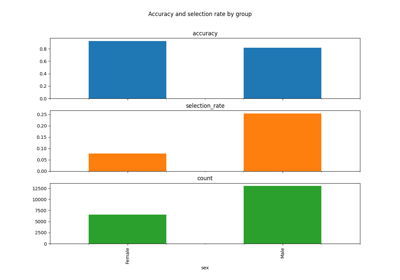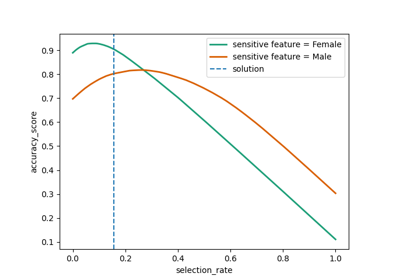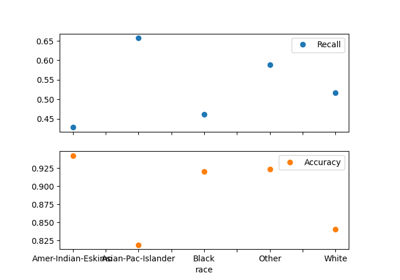fairlearn.datasets.fetch_adult#
- fairlearn.datasets.fetch_adult(*, cache=True, data_home=None, as_frame=True, return_X_y=False)[source]#
Load the UCI Adult dataset (binary classification).
Read more in the User Guide.
Download it if necessary.
Samples total
48842
Dimensionality
14
Features
numeric, categorical
Classes
2
Source:
Prediction task is to determine whether a person makes over $50,000 a year.
Read more in the User Guide.
Added in version 0.5.0.
- Parameters:
- cachebool, default=True
Whether to cache downloaded datasets using joblib.
- data_homestr, default=None
Specify another download and cache folder for the datasets. By default, all fairlearn data is stored in ‘~/.fairlearn-data’ subfolders.
- as_framebool, default=True
If True, the data is a pandas DataFrame including columns with appropriate dtypes (numeric, string or categorical). The target is a pandas DataFrame or Series depending on the number of target_columns. The Bunch will contain a
frameattribute with the target and the data. Ifreturn_X_yis True, then(data, target)will be pandas DataFrames or Series as describe above.Changed in version 0.9.0: Default value changed to True.
- return_X_ybool, default=False
If True, returns
(data.data, data.target)instead of a Bunch object.
- Returns:
- dataset
Bunch Dictionary-like object, with the following attributes.
- datandarray, shape (48842, 14)
Each row corresponding to the 14 feature values in order. If
as_frameis True,datais a pandas object.- targetnumpy array of shape (48842,)
Each value represents whether the person earns more than $50,000 a year (>50K) or not (<=50K). If
as_frameis True,targetis a pandas object.- feature_nameslist of length 14
Array of ordered feature names used in the dataset.
- DESCRstring
Description of the UCI Adult dataset.
- categoriesdict or None
Maps each categorical feature name to a list of values, such that the value encoded as i is ith in the list. If
as_frameis True, this is None.- framepandas DataFrame
Only present when
as_frameis True. DataFrame withdataandtarget.
- (data, target)tuple if
return_X_yis True
- dataset
Notes
Our API largely follows the API of
sklearn.datasets.fetch_openml().References
[1]Kohavi, R. (1996). UCI Adult dataset. https://archive.ics.uci.edu/ml/datasets/adult
[2]Kohavi, R., & Becker, B. (1996). Scaling Up the Accuracy of Naive-Bayes Classifiers: a Decision-Tree Hybrid. KDD.
- Return type:
Gallery examples#

Basics & Model Specification of AdversarialFairness





